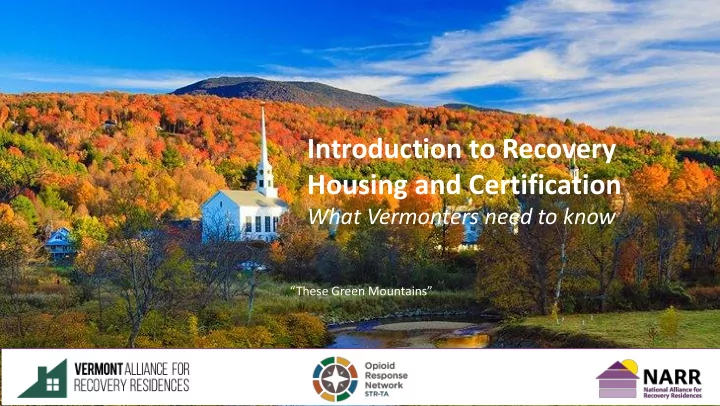

Introduction to Recovery Housing and Certification What Vermonters need to know “These Green Mountains”
Background • Higher Education (Champlain and UVM) • United Way (Vermont 211) • Mental Health (CARF Accreditation) • Health Care (NMC) • Federal Grand Jury • Recovery Residences (NARR Certification)
Vermont Alliance for Recovery Residences VTARR is the Vermont Affiliate to the National Alliance of Recovery Residences (NARR). We are committed to improving access to Recovery Residences through established national standards, a fair and transparent certification process, community engagement, education, technical assistance, research, and advocacy.
The Need Not long ago a Vermonter could wait days to be able to access medically assisted treatment (MAT), considered a best practice, for opioid dependence. These delays created opportunities for continued use and in some cases death due to overdose. Today, the State of Vermont has a robust hub and spoke system, which provides enhanced access to MAT. Over 8,500 Vermonters are currently in some form of MAT. Thousands of individuals are pursuing recovery through other forms of therapy. Let us also not forget that there are many forms of substance use disorder (SUD). For example, Vermont has the 4 th highest rate of alcohol dependence and the highest rate of illicit drug use disorder in the country. Currently there are only recovery beds available for 2% of this population. Arguably, recovery housing is the next critical link to addressing Vermont’s overall SUD crisis. Efforts are underway to scale this critical resource and, at the same time, systems and legislation are needed to establish sustainability, ensure quality and combat stigma.
VTARR Vermont Alliance for Recovery Residences
Recovery housing in the U.S. Mid-1900s Founding of Alcoholics Anonymous Social Model of Recovery Association of Halfway House Alcoholism Programs of North America (AHHAP): workforce development and certification 1840s 2011 to present earliest records Early 2000s National Alliance for Recovery of recovery More regional organizations: Residences (NARR): housing MASH, CCAR… Standard v1.0 (2011) Late 1900s to present Regional standards, training First white paper (2012) and certification Oxford House (1975) Merged w/AHHAP (2013) Significant expansion in 70s/80s regional organizations SUPPORT Act (2018) numbers and types of formed: CAARR, GARR, SLN… residences Today: 29 states and Regional standards, training and growing! certifications VTARR Vermont Alliance for Recovery Residences
✓ Standard for Recovery ✓ Partnerships with state affiliate Residences organizations ✓ Code of Ethics ✓ Technical assistance to state governments, others ✓ Levels of recovery support ✓ Advocacy, policy work ✓ Best practices from around the nation ✓ VTARR is your NARR affiliate VTARR Vermont Alliance for Recovery Residences
✓ Founded in 2011 by recovery housing organizations and individuals with expertise ✓ Affiliate organizations in 29 states and more in development ✓ Collaboration with SAMHSA; recognized as recovery housing authority by White House Office of National Drug Control Policy ✓ Works with, and supports, state recovery housing organizations ✓ Network of relationships includes federal and state agencies, other national organizations VTARR Vermont Alliance for Recovery Residences
Five key elements of recovery residences Housing Individuals with substance use disorders Abstinence-based Peer recovery support Operates as a family-like community VTARR Vermont Alliance for Recovery Residences
VTARR Vermont Alliance for Recovery Residences
NARR Standard Version 3.0 (2018) Administration 31 elements, four domains Physical Environment Roughly 100 individual indicators Recovery Support Download from narronline.org Good Neighbor VTARR Vermont Alliance for Recovery Residences
NARR Code of Ethics Separate document than the residence standards Consistent with and referenced in Standard 3.0, other professional ethics codes Binding on all individuals: everyone in positions of responsibility and authority, including staff, volunteers, contractors and residents VTARR Vermont Alliance for Recovery Residences
Residence evaluation Formal application process Review of residence documents, policies and procedures Structured interviews with operator, staff & residents Site assessment Standards evolved from “tell us” to “show us” VTARR Vermont Alliance for Recovery Residences
Certification Benefits to Provider • Quality Assurance and Best Practices • Independent Grievance Process • Access to Participant Resident Assistance Funds • Medicaid Support for Service Delivery will Require Certification • State Legislation supporting Recovery Homes will require Certification • Referrals will Only be Made to Certified Homes • Certification will be Required to Access State and Federal Funds • Reimbursement and/or pro-bono Testing • Networking, Technical Support and Best Practices
Legislative Intent • Importance of Sober Environment • Safety and Sobriety of Members Living in a Recovery Residence • Stepped Process to Support an Individual's Reoccurrence • Standard Recovery Residence Definition • Common Zoning Language
Contact Jeffrey T. Moreau, CFRE, CRC, MPA Executive Director Vermont Alliance for Recovery Residences jeff.moreau@vtarr.org; (802) 383-1911 VTARR Vermont Alliance for Recovery Residences
Recommend
More recommend